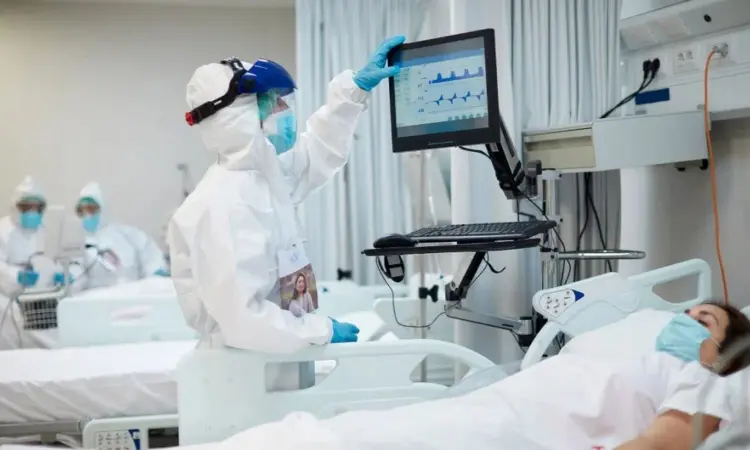- Home
- Medical news & Guidelines
- Anesthesiology
- Cardiology and CTVS
- Critical Care
- Dentistry
- Dermatology
- Diabetes and Endocrinology
- ENT
- Gastroenterology
- Medicine
- Nephrology
- Neurology
- Obstretics-Gynaecology
- Oncology
- Ophthalmology
- Orthopaedics
- Pediatrics-Neonatology
- Psychiatry
- Pulmonology
- Radiology
- Surgery
- Urology
- Laboratory Medicine
- Diet
- Nursing
- Paramedical
- Physiotherapy
- Health news
- Fact Check
- Bone Health Fact Check
- Brain Health Fact Check
- Cancer Related Fact Check
- Child Care Fact Check
- Dental and oral health fact check
- Diabetes and metabolic health fact check
- Diet and Nutrition Fact Check
- Eye and ENT Care Fact Check
- Fitness fact check
- Gut health fact check
- Heart health fact check
- Kidney health fact check
- Medical education fact check
- Men's health fact check
- Respiratory fact check
- Skin and hair care fact check
- Vaccine and Immunization fact check
- Women's health fact check
- AYUSH
- State News
- Andaman and Nicobar Islands
- Andhra Pradesh
- Arunachal Pradesh
- Assam
- Bihar
- Chandigarh
- Chattisgarh
- Dadra and Nagar Haveli
- Daman and Diu
- Delhi
- Goa
- Gujarat
- Haryana
- Himachal Pradesh
- Jammu & Kashmir
- Jharkhand
- Karnataka
- Kerala
- Ladakh
- Lakshadweep
- Madhya Pradesh
- Maharashtra
- Manipur
- Meghalaya
- Mizoram
- Nagaland
- Odisha
- Puducherry
- Punjab
- Rajasthan
- Sikkim
- Tamil Nadu
- Telangana
- Tripura
- Uttar Pradesh
- Uttrakhand
- West Bengal
- Medical Education
- Industry
Non invasive ventilation with tocilizumab improves survival in hospitalized COVID-19 patients

Brazil: The use of simple oxygen only and noninvasive ventilation (NIV) was shown to be associated with a mortality benefit from tocilizumab in a Bayesian reanalysis of a previous meta-analysis of 15 studies of hospitalized COVID-19 patients treated with tocilizumab and corticosteroids. The study appeared in JAMA Network Open on February 28, 2022.
A meta-analysis from World Health Organization (WHO) found that tocilizumab (an interleukin 6 antagonist) was linked to reduced mortality in hospitalized COVID-19 patients. However, the magnitude of tocilizumab's benefits and whether its association with mortality benefit is similar across respiratory subgroups remains uncertain.
Considering the above, Arthur M. Albuquerque, School of Medicine, Universidade Federal do Rio de Janeiro, Rio de Janeiro, Brazil, and colleagues aimed to use Bayesian methods to assess the magnitude of mortality benefit associated with tocilizumab and the differences between respiratory support subgroups in hospitalized patients with COVID-19.
For this purpose, the authors performed a bayesian hierarchical reanalysis of the WHO meta-analysis of tocilizumab studies published in 2020 and 2021. Using weakly informative priors to exert little influence on the observed data, main results were estimated. The results' robustness was evaluated using vague and informative priors. The meta-analysis featured randomized clinical tocilizumab trials of hospitalized patients with COVID-19. Only patients receiving corticosteroids were included.
Usual care plus tocilizumab in comparison with usual care or placebo were the study's exposures. The main outcome was all-cause mortality at 28 days after randomization.
A total of 5339 patients were included in this analysis, most were men, with mean ages between 56 and 66 years. 2117 patients received simple oxygen only, 2505 received noninvasive ventilation, and 717 received invasive mechanical ventilation (IMV) in 15 studies from multiple countries and continents.
Salient findings of the study include:
- Assuming weakly informative priors, the overall odds ratios (ORs) for survival were 0.70 for patients receiving simple oxygen only, 0.81 for patients receiving NIV, and 0.89 for patients receiving IMV, respectively.
- The posterior probabilities of any benefit (OR <1) were notably different between patients receiving simple oxygen only (98.9%), NIV (95.5%), and IMV (75.4%).
- The posterior probabilities of a clinically meaningful association (absolute mortality risk difference >1%) were greater than 95% in patients receiving simple oxygen only and greater than 90% in patients receiving NIV. In contrast, the posterior probability of this clinically meaningful association was only approximately 67% in patients receiving IMV.
- The probabilities of tocilizumab superiority in the simple oxygen-only subgroup compared with the NIV and IMV subgroups were 85% and 90%, respectively.
- Predictive intervals highlighted that only 72.1% of future tocilizumab IMV studies would show benefit. The conclusions did not change with different prior distributions.
"In this Bayesian reanalysis of a previous meta-analysis of 15 RCTs, it was revealed that patients with COVID-19 receiving simple oxygen only or noninvasive ventilation and receiving tocilizumab treatment were associated with a probability of a clinically meaningful mortality benefit," wrote the authors.
"In patients receiving IMV however, the beneficial association of this drug was uncertain and increased harm was not conclusively excluded." "Future research should better define whether patients receiving IMV also benefit from tocilizumab."
Reference:
Albuquerque AM, Tramujas L, Sewanan LR, Williams DR, Brophy JM. Mortality Rates Among Hospitalized Patients With COVID-19 Infection Treated With Tocilizumab and Corticosteroids: A Bayesian Reanalysis of a Previous Meta-analysis. JAMA Netw Open. 2022;5(2):e220548. doi:10.1001/jamanetworkopen.2022.0548
Dr Kamal Kant Kohli-MBBS, DTCD- a chest specialist with more than 30 years of practice and a flair for writing clinical articles, Dr Kamal Kant Kohli joined Medical Dialogues as a Chief Editor of Medical News. Besides writing articles, as an editor, he proofreads and verifies all the medical content published on Medical Dialogues including those coming from journals, studies,medical conferences,guidelines etc. Email: drkohli@medicaldialogues.in. Contact no. 011-43720751


